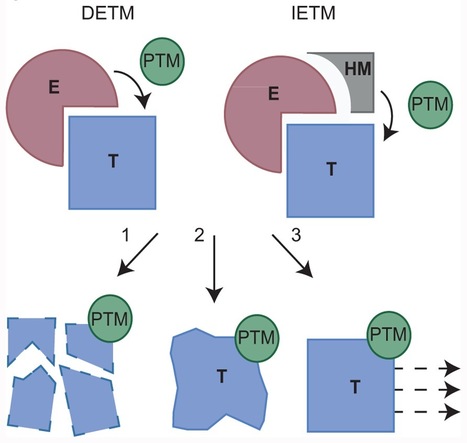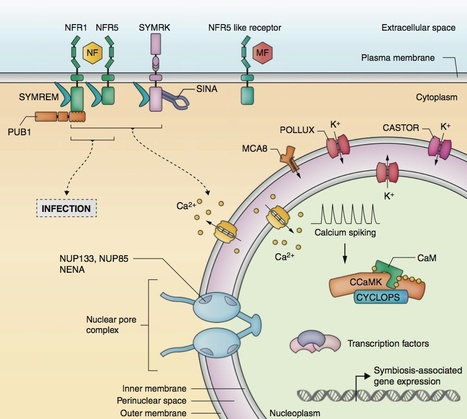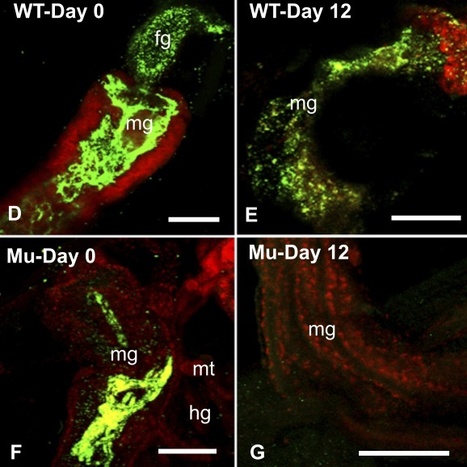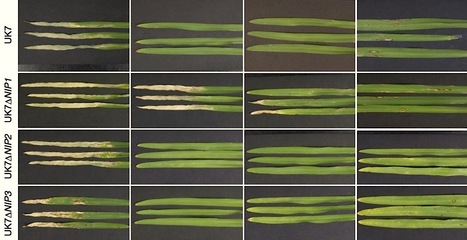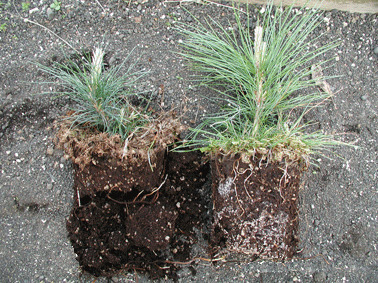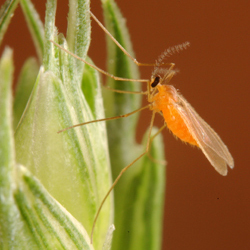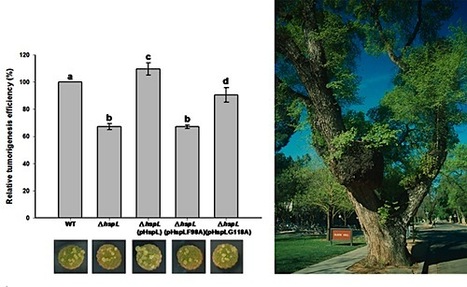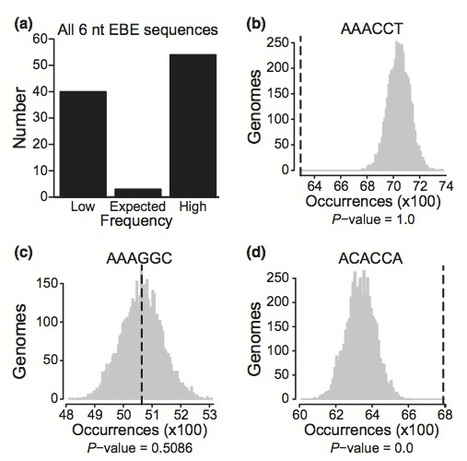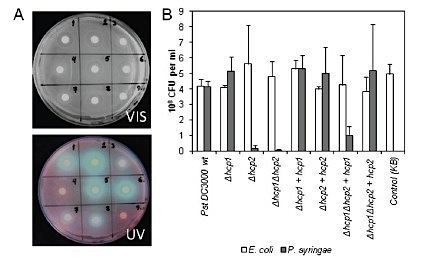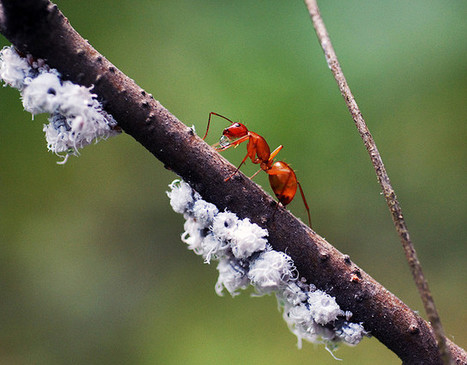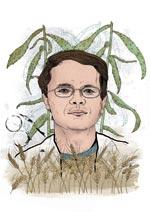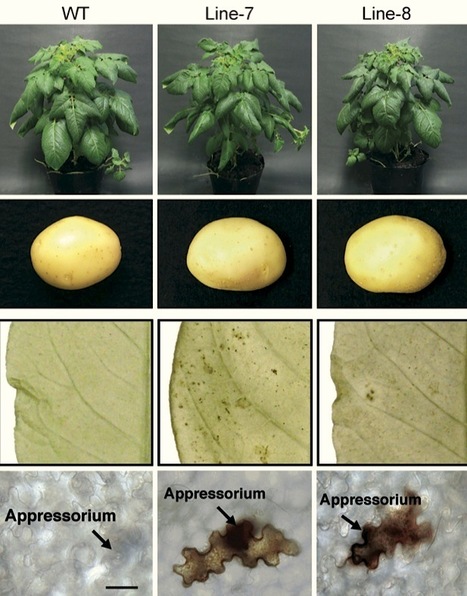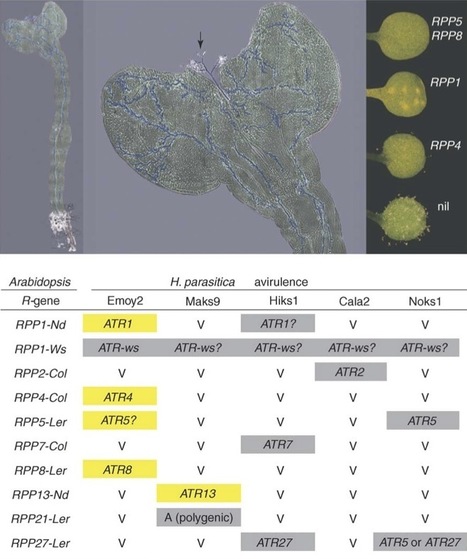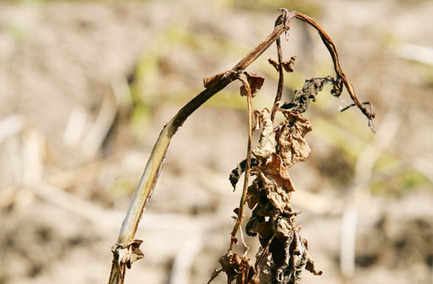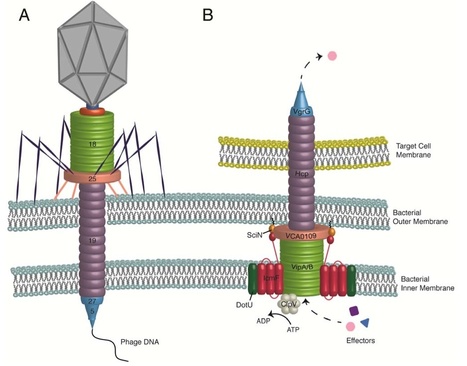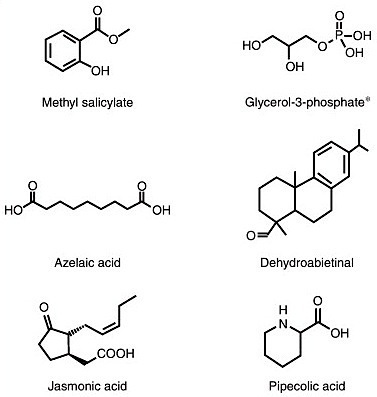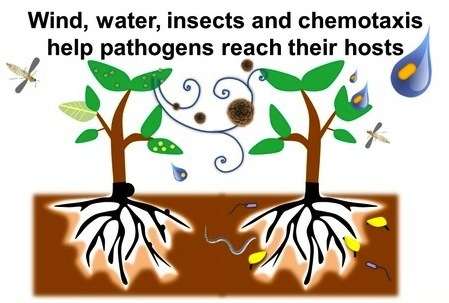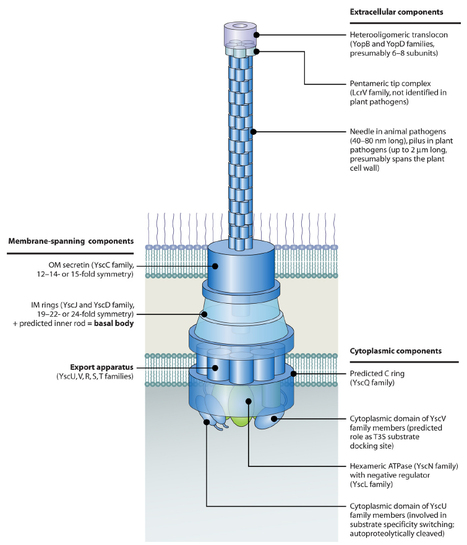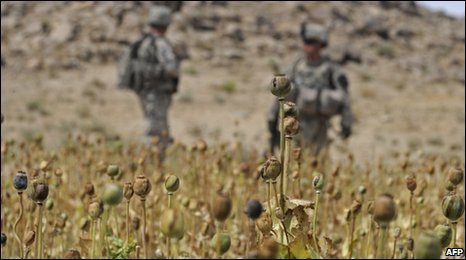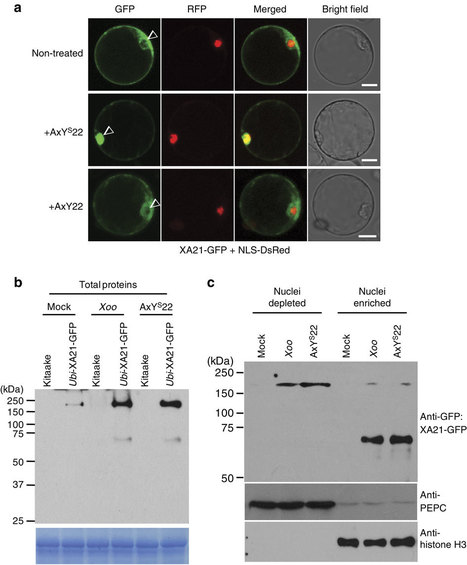 Your new post is loading...
 Your new post is loading...

|
Scooped by
Kamoun Lab @ TSL
July 17, 2012 2:05 PM
|
Plant–pathogen interactions feature complex signaling exchanges between host and microbes that ultimately determine association outcomes. Plants deploy pattern recognition receptors to perceive pathogen-associated molecular patterns, mount pattern-triggered immunity (PTI), and fend off potential pathogens. In recent years an increasing number of defense-signaling components have been identified along with a mechanistic understanding of their regulation during immune responses. Post-translational modifications (PTMs) are now thought to play a crucial role in regulating defense signaling. In a bid to suppress PTI and infect their host, pathogens have evolved large repertoires of effectors that trigger susceptibility and allow colonization of host tissues. While great progress has been made in elucidating defense-signaling networks in plants and the activities of effectors in immune suppression, a critical gap exists in our understanding of effector mechanism-of-action. Given the importance of PTMs in the regulation of defense signaling, we will explore the question: how do effectors modify the post-translational status of host proteins and thus interfere with host processes required for immunity? We will consider how emerging proteomics-based experimental strategies may help us answer this important question and ultimately open the pathogens’ effector black box.

|
Scooped by
Kamoun Lab @ TSL
July 12, 2012 5:42 PM
|
The key molecular event during the development of arbuscular mycorrhiza and the root nodule symbiosis is the activation of calcium- and calmodulin-dependentproteinkinase (CCaMK). Its regulation is complex and involves positive as well as negative regulation facilitated by autophosphorylation of two conserved sites. Deregulated versions of CCaMK are sufficient for mediating both organogenesis and infection processes. Epistasis tests demonstrated that a main function of signaling components upstream of calcium spiking is the activation of CCaMK. Despite CCaMK being a central signaling hub, specificity for both symbioses exists, resulting in differential transcriptional gene expression patterns. While the specificity upstream of CCaMK can be conceptualized by the specific perception of rhizobial and fungal lipo-chitooligosaccharides via cognate LysM receptors, the mechanisms conferring transcriptional specificity downstream of CCaMK are likely conferred by a variety of transcriptional regulators, mediating symbiosis appropriate gene regulation. ► AM fungi produce lipo-chitooligosaccharides structurally closely related to rhizobial Nod factors that induce lateral root formation in plants. It is thus conceivable that production of LCOs by rhizobia was a key step during the evolution of the root nodule symbiosis. ► RNAi of an NFR5-like LysM receptor like kinase (RLK) from the non-legume Parasponia led to reduced AM formation, pinpointing LysM RLKs as candidates for fungal LCO receptors. ► High frequency calcium-spiking is observed during AM fungal and rhizobial plant cell infection, thus making specific spiking signatures less likely to be responsible for differential gene induction in both symbioses. ► CCaMK emerges as the centralregulator upstream of nodule organogenesis and infection. ► A direct uptake system for bacteria by plantroot cortex cells was discovered that is activated by deregulated CCaMK and in this situation does not require Nod factor.

|
Scooped by
Kamoun Lab @ TSL
July 11, 2012 5:46 AM
|
Plant and animal-pathogenic bacteria utilize phylogenetically distinct type III secretion systems (T3SS) that produce needle-like injectisomes or pili for the delivery of effector proteins into host cells. Pantoea stewartii subsp. stewartii (Pnss), the causative agent of Stewart's bacterial wilt and leaf blight of maize, carries phylogenetically distinct T3SSs. In addition to an Hrc-Hrp T3SS, known to be essential for maize pathogenesis, Pnss has a second T3SS (PSI-2) that is required for persistence in its flea beetle vector, Chaetocnema pulicaria (Melsh). PSI-2 belongs to the Inv-Mxi-Spa T3SS family typically found in animal pathogens. Mutagenesis of the PSI-2 psaN gene, which encodes an ATPase essential for secretion of T3SS effectors by the injectisome, greatly reduces both the persistence of Pnss in flea beetle guts and the beetle's ability to transmit Pnss to maize. Ectopic expression of the psaN gene complements these phenotypes. In addition, the PSI-2 psaN gene is not required for Pnss pathogenesis of maize and is transcriptionally up-regulated in insects compared to maize tissues. Thus, the Hrp and PSI-2 T3SSs play different roles in the life cycle of Pnss as it alternates between its insect vector and plant host.

|
Scooped by
Kamoun Lab @ TSL
July 10, 2012 5:42 AM
|
The barley pathogen Rhynchosporium commune secretes necrosis-inducing proteins NIP1, NIP2 and NIP3. Expression analysis revealed that NIP1 transcripts apperas to be present in fungal spores already, whereas NIP2 and NIP3 are synthesized after inoculation of host plants. To assess the contribution of the three effector proteins to disease development, deletion mutants were generated. The development of these fungal mutants on four barley cultivars was quantified in comparison with that of the parent wild type strain and with two fungal strains failing to secrete an “active” NIP1 avirulence protein, using qPCR as well as microscopic imaging after fungal GFP-tagging. The impact of the three deletions varied quantitatively depending on the host genotype, suggesting that the activities of the fungal effectors add up to produce stronger growth patterns and symptom development. Alternatively, recognition events of differing intensities may be converted into defense gene expression in a quantitative manner.

|
Scooped by
Kamoun Lab @ TSL
July 9, 2012 11:20 AM
|

|
Scooped by
Kamoun Lab @ TSL
July 7, 2012 4:34 AM
|
CRESTON- Some Flathead Valley spring wheat farmers lost 100% yield on their crops to the Orange Wheat Blossom Midge infestation in 2006 and it looks like the midge insect is back in full force again this year. The midges are about half the size of a mosquito, but they can take out an entire crop of spring wheat. Agronomists at the Montana State University agricultural center are finding the midge in huge numbers across the valley. The insect can damage developing wheat kernels and increase the chances of fungal infections. Agronomist Bob Stougaard said some farmers didn't bother to try harvesting because the damage was so bad and adds he's found over 450 midges in one evening.

|
Scooped by
Kamoun Lab @ TSL
July 6, 2012 5:36 AM
|
The long-term research interest in my laboratory is to understand the molecular mechanisms underlying how the plant pathogenic bacterium Agrobacterium tumefaciens interacts and successfully infects the host plants. A. tumefaciens is uniquely adapted for conducting plant transformation by horizontal transmission of DNA. It is well known that A. tumefaciens utilizes the VirA/VirG two-component system to activate the expression of virulence genes for transfer and delivery of T-DNA/effectors by the type IV secretion system (T4SS) from bacteria into the host plant cells. However, it remains unclear how A. tumefaciens delivers T4SS effectors across plant cell wall/membrane and overcomes several lines of host defense response for successful infection.

|
Scooped by
Kamoun Lab @ TSL
July 3, 2012 12:53 PM
|
• Xanthomonas transcription activator-like (TAL) effectors promote disease in plants by binding to and activating host susceptibility genes. Plants counter with TAL effector-activated executor resistance genes, which cause host cell death and block disease progression. We asked whether the functional specificity of an executor gene could be broadened by adding different TAL effector binding elements (EBEs) to it.
• We added six EBEs to the rice Xa27 gene, which confers resistance to strains of the bacterial blight pathogen Xanthomonas oryzae pv. oryzae (Xoo) that deliver the TAL effector AvrXa27. The EBEs correspond to three other effectors from Xoo strain PXO99A and three from strain BLS256 of the bacterial leaf streak pathogen Xanthomonas oryzae pv. oryzicola (Xoc).
• Stable integration into rice produced healthy lines exhibiting gene activation by each TAL effector, and resistance to PXO99A, a PXO99A derivative lacking AvrXa27, and BLS256, as well as two other Xoo and 10 Xoc strains virulent toward wildtype Xa27 plants. Transcripts initiated primarily at a common site. Sequences in the EBEs were found to occur nonrandomly in rice promoters, suggesting an overlap with endogenous regulatory sequences.
• Thus, executor gene specificity can be broadened by adding EBEs, but caution is warranted because of the possible coincident introduction of endogenous regulatory elements.
When analysing the secretome of the plant pathogen Pseudomonas syringae pv. tomato (Pst) DC3000, we identified hemolysin co-regulated protein (Hcp) as one of the secreted proteins. Hcp is assumed to be an extracellular component of the type VI secretion system (T6SS). Two copies of hcp genes are present in the Pst DC3000 genome, hcp1 (PSPTO_2539) and hcp2 (PSPTO_5435). We studied the expression patterns of hcp genes and tested the fitness of hcp knock-out mutants in host plant colonization and in inter-microbial competition. We found that the hcp2 gene is expressed, most actively at the stationary growth phase, and that the Hcp2 protein is secreted via T6SS and appears in the culture medium as covalently linked dimers. Expression of hcp2 is not induced in planta and it does not contribute to virulence or colonisation in tomato or Arabidopsis plants. Instead, hcp2 is required for survival in competition with enterobacteria and yeasts, and its function is associated with suppression of the growth of these competitors. This is the first report on bacterial T6SS-associated genes functioning in competition against yeast. Our results suggest that the T6SS of P. syringae may play an important role in bacterial fitness, allowing this plant pathogen to survive in conditions where it has to compete with other micro-organisms for resources.
Via Nicolas Denancé

|
Scooped by
Kamoun Lab @ TSL
June 28, 2012 2:35 AM
|
Note the drop of honey dew that the ant has picked up from the aphids. Many types of aphids are protected by ant guardians, and woolly alder aphids are no exception. These ants protect the aphids from predators and competitors. Whether a human finger poking the branches or a caterpillar looking for a leaf to chew, the ants rush out to bite and otherwise discourage anything that touches the aphids’ alder. In return, the ants milk the aphids for honeydew, which is a sweet concentration of plant sap that the aphids excrete. When the ant guardian strokes an aphid with its antennae, the aphid, like the cow being milked by the farmer, releases a drop of honeydew.

|
Scooped by
Kamoun Lab @ TSL
June 28, 2012 2:18 AM
|
The compatible interaction between the model plant, Arabidopsis thaliana, and the GMI1000 strain of the phytopathogenic bacterium, Ralstonia solanacearum, was investigated in an in vitro pathosystem. We describe the progression of the bacteria in the root from penetration at the root surface to the xylem vessels and the cell type specific, cell wall-associated modifications that accompanies bacterial colonization. Within 6 days post inoculation, R. solanacearum provoked a rapid plasmolysis of the epidermal, cortical, and endodermal cells, including those not directly in contact with the bacteria. Plasmolysis was accompanied by a global degradation of pectic homogalacturonanes as shown by the loss of JIM7 and JIM5 antibody signal in the cell wall of these cell types. As indicated by immunolabeling with Rsol-I antibodies that specifically recognize R. solanacearum, the bacteria progresses through the root in a highly directed, centripetal manner to the xylem poles, without extensive multiplication in the intercellular spaces along its path. Entry into the vascular cylinder was facilitated by cell collapse of the two pericycle cells located at the xylem poles. Once the bacteria reached the xylem vessels, they multiplied abundantly and moved from vessel to vessel by digesting the pit membrane between adjacent vessels. The degradation of the secondary walls of xylem vessels was not a prerequisite for vessel colonization as LM10 antibodies strongly labeled xylem cell walls, even at very late stages in disease development. Finally, the capacity of R. solanacearum to specifically degrade certain cell wall components and not others could be correlated with the arsenal of cell wall hydrolytic enzymes identified in the bacterial genome.

|
Scooped by
Kamoun Lab @ TSL
June 27, 2012 5:33 AM
|
It was only when his supervisor showed him a picture of a tractor crossing a rust-infected field of wheat that Peter Dodds really understood what he was up against. Behind the tractor bloomed an orange plume of spores several times higher than the vehicle itself. "It is just amazing the amount of spores that get released in an infected wheat field," says Dodds. "It is like looking at Mount Everest."
The cloud of fungal spores revealed a terrifying strength in numbers. You might think that if a mutation that will overcome wheat's resistance to a strain of rust is a one in a million fluke it would not be worth worrying about. But there in that one picture were thousands of billions of spores, obscuring the sky. And there are millions of fields.

|
Scooped by
Kamoun Lab @ TSL
June 26, 2012 6:13 PM
|
Photo shows a larva of an invasive sawfly recently discovered in Europe. Researchers say it will be a real pest of elms in Europe in the next years. Young larva gnaws unusual curves in the leaves, then it feeds the whole leaf. Pupate in the surface of the leaf, emerge from the soil. If you are interested in this species, you can read an article in PDF here http://www.eje.cz/pdfarticles/1547/eje_107_3_357_Blank.pdf
|

|
Scooped by
Kamoun Lab @ TSL
July 16, 2012 2:26 PM
|
Every four years, the Olympic Games plays host to competitors who have built on their natural talent by training for many years to become the best in their chosen discipline. Similar spirit and endeavour can be found throughout the microbial world, in which every day is a competition to survive and thrive. Microorganisms are trained through evolution to become the fittest and the best adapted to a particular environmental niche or lifestyle, and to innovate when the 'rules of the game' are changed by alterations to their natural habitats. In this Essay, we honour the best competitors in the microbial world by inviting them to take part in the inaugural Microbial Olympics. Plant pathogens among the Microbial Olympics medalists!

|
Scooped by
Kamoun Lab @ TSL
July 12, 2012 4:29 AM
|
• Potato (Solanum tuberosum) calcium-dependent protein kinase (StCDPK5) has been shown to phosphorylate the N-terminal region of plasma membrane RBOH (respiratory burst oxidase homolog) proteins, and participate in StRBOHB-mediated reactive oxygen species (ROS) burst. The constitutively active form, StCDPK5VK, provides a useful tool for gain-of-function analysis of RBOH in defense responses.
• StCDPK5- and StCDPK5VK-green fluorescent protein fusion proteins were predominantly targeted to the plasma membrane, and conditional expression of StCDPK5VK activated StRBOHA-D. The interaction was confirmed by bimolecular fluorescence complementation assay. We generated transgenic potato plants containing StCDPK5VK under the control of a pathogen-inducible promoter to investigate the role of ROS burst on defense responses to blight pathogens.
• Virulent isolates of the late blight pathogen Phytophthora infestans and the early blight pathogen Alternaria solani induced hypersensitive response-like cell death accompanied by ROS production at the infection sites of transgenic plants. Transgenic plants showed resistance to the near-obligate hemibiotrophic pathogen P. infestans and, by contrast, increased susceptibility to the necrotrophic pathogen A. solani.
• These results indicate that RBOH-dependent ROS contribute to basal defense against near-obligate pathogens, but have a negative role in resistance or have a positive role in expansion of disease lesions caused by necrotrophic pathogens.

|
Scooped by
Kamoun Lab @ TSL
July 10, 2012 8:09 AM
|
Birth of a Hyaloperonospora arabidopsidis (ex parasitica) isolate (Emoy2) and oomycete genomics in Arabidopsis thaliana. Emoy2 was germinated from a sexual oospore (DOB 18 June 1991) that infected a Columbia seedling via the root (far left photo) and colonized the hypocotyl and both cotyledons (hyphae shaded in blue, false color) before producing two sporangiophores (black arrow) bearing asexual conidiosporangia (middle photo). Four standard Arabidopsis accessions, Columbia (Col), Landsberg erecta (Ler), Niederzenz (Nd) and Wassilewskija (Ws), each exhibit resistant phenotypes following the infection of cotyledons with Emoy2 (far right photo). These phenotypes range from full resistance with no sporulation and a barely visible host response (top cotyledon), through patches of necrosis and no sporulation (second from top) and weak necrosis that trails behind the hyphal growth of the parasite and partial sporulation (third from top), to full susceptibility (bottom cotyledon). Downy mildew resistance genes (RPP, for recognition of Peronospora parasitica) that confer these different phenotypes have been characterized molecularly.

|
Scooped by
Kamoun Lab @ TSL
July 10, 2012 5:05 AM
|
Dutch tests on a new strain of potato blight similar to that discovered for the first time in the UK last year have shown some isolates have reduced sensitivity to the common active fluazinam used to control the disease. The results from the Dutch trials have, however, prompted experts to remind growers of the importance of following best practice guidelines when using fluazinam this season. The fear is that fluazinam insensitive phyptophthora infestans could become established in the UK. The new blight strain 33_A2 (known as Green 33) accounts for about 20% of the blight population in the Netherlands. In the UK, however, it has not been found in commercial crops. "However Green 33 was found last year on a volunteer plant in Norfolk, the risk of finding it this year could be higher specifically for crops grown from seed imported from the Netherlands," says Ruairidh Bain, potato consultant at the Scottish Agricultural College.

|
Scooped by
Kamoun Lab @ TSL
July 8, 2012 6:02 AM
|
> What to Expect in Kyoto
> Letter from the President
> IS-MPMI to Exhibit at Congress
> Meetings
> PhytoPath—A New Database Integrates Genome-Scale Data
> XV International Congress on MPMI Preliminary Program
> MPMI Journal Articles

|
Scooped by
Kamoun Lab @ TSL
July 6, 2012 9:21 AM
|
Whether they live in the soil, drift in the ocean, survive in the lungs of human hosts or reside on the surfaces of leaves, all bacteria must cope with an array of environmental stressors. Bacteria have evolved an impressive suite of protein secretion systems that enable their survival in hostile environments and facilitate colonization of eukaryotic hosts. Collectively, gram-negative bacteria produce six distinct secretion systems that deliver proteins to the extracellular milieu or directly into the cytosol of host cells. The type VI secretion system (T6SS) was discovered recently and is encoded in at least one fourth of all sequenced gram-negative bacterial genomes. T6SS proteins are evolutionarily and structurally related to phage proteins, and it is likely that the T6SS apparatus is reminiscent of phage injection machinery. Most studies of T6SS function have been conducted in the context of host-pathogen interactions. However, the totality of data suggests that the T6SS is a versatile tool with roles in virulence, symbiosis, interbacterial interactions, and antipathogenesis. This review gives a brief history of T6SS discovery and an overview of the pathway's predicted structure and function. Special attention is paid to research addressing the T6SS of plant-associated bacteria, including pathogens, symbionts and plant growth–promoting rhizobacteria.

|
Scooped by
Kamoun Lab @ TSL
July 4, 2012 7:38 AM
|
Following pathogen infection, activation of systemic acquired resistance (SAR) in uninfected tissues requires transmission of a signal(s) from the infected tissue via the vasculature. Several candidates for this long-distance signal have been identified, including methyl salicylate (MeSA), an SFD1/GLY1-derived glycerol-3-phosphate (G3P)-dependent signal, the lipid-transfer protein DIR1, the dicarboxylic acid azelaic acid (AzA), the abietane diterpenoid dehydroabietinal (DA), jasmonic acid (JA), and the amino acid-derivative pipecolic acid (Pip). Some of these signals work cooperatively to activate SAR and/or regulate MeSA metabolism. However, Pip appears to activate SAR via an independent pathway that may impinge on these other signaling pathway(s) during de novo salicylic acid (SA) biosynthesis in the systemic tissue. Thus, a complex web of cross-interacting signals appears to activate SAR.
4th Xanthomonas Genomics Conference, Angers, France, July 9 - 12, 2012
Xanthomonas Genomics Conference is an exciting and friendly meeting. Scientists from all around the world gather to pursue community-driven advances, taking into account the growing number of available sequenced genomes. The goals of this 4th conference are to (i) share and discuss recent discoveries on xanthomonads and Xanthomonas-plant interactions, (ii) identify opportunities and important challenges, (iii) discuss new technologies and approaches. See more at: https://colloque4.inra.fr/xgc2012
Via Nicolas Denancé
Oomycetes and fungi and bacteria, oh my! Check out the slides, lecture notes and teaching guide, providing a broad introduction to how plants recognize and respond to pathogens, as well as agricultural practices for disease prevention. Enjoy!
Via Mary Williams
Flagellar and translocation-associated type III secretion (T3S) systems are present in most Gram-negative plant- and animal-pathogenic bacteria and are often essential for bacterial motility or pathogenicity. The architectures of the complex membrane-spanning secretion apparatuses of both systems are similar, but they are associated with different extracellular appendages, including the flagellar hook and filament or the needle/pilus structures of translocation-associated T3S systems. The needle/pilus is connected to a bacterial translocon that is inserted into the host plasma membrane and mediates the transkingdom transport of bacterial effector proteins into eukaryotic cells. During the last 3 to 5 years, significant progress has been made in the characterization of membrane-associated core components and extracellular structures of T3S systems. Furthermore, transcriptional and posttranscriptional regulators that control T3S gene expression and substrate specificity have been described. Given the architecture of the T3S system, it is assumed that extracellular components of the secretion apparatus are secreted prior to effector proteins, suggesting that there is a hierarchy in T3S. The aim of this review is to summarize our current knowledge of T3S system components and associated control proteins from both plant- and animal-pathogenic bacteria.
Via Nicolas Denancé

|
Scooped by
Kamoun Lab @ TSL
June 27, 2012 6:27 PM
|
A fresh blight is poised to hit Afghanistan's poppy fields this year, driving up opium prices and threatening to fuel a shift to potentially lethal heroin substitutes like "krokodil", the U.N. drugs watchdog said on Tuesday.
Plant diseases destroyed nearly half the 2010 opium harvest in Afghanistan, the world's biggest producer, but output there rebounded 61 percent last year, the U.N. Office on Drugs and Crime (UNODC) said in its 2012 World Drug Report. That helped put global opium production at 7,000 metric tons (7716.2 tons) in 2011, still more than a fifth below the 2007 peak. "We may anticipate that this year there will be another plant disease - maybe not to the same scale as 2010 - but (it) still may affect, especially in the southern part of Afghanistan, poppy cultivation," UNODC Executive Director Yuri Fedotov said.

|
Scooped by
Kamoun Lab @ TSL
June 27, 2012 4:27 AM
|
Plants and animals carry specific receptors that recognize invading pathogens and respond by activating an immune response. The rice XA21 receptor confers broad-spectrum immunity to the Gram-negative bacterial pathogen, Xanthomonas oryzae pv. oryzae upon recognition of a small protein, Ax21, that is conserved in all Xanthomonas species and related genera. Here we demonstrate that XA21 is cleaved to release the intracellular kinase domain and that this intracellular domain carries a functional nuclear localization sequence. Bimolecular fluorescence complementation assays indicate that the XA21 intracellular domain interacts with the OsWRKY62 transcriptional regulator exclusively in the nucleus of rice protoplasts. In vivo cleavage of XA21 and translocalization of the intracellular kinase domain to the nucleus is required for the XA21-mediated immune response. These results suggest a new model for immune receptor function: on receptor recognition of conserved microbial signatures, the associated kinase translocates to the nucleus where it directly interacts with transcriptional regulators.
|



 Your new post is loading...
Your new post is loading...

